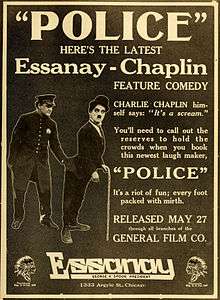Police (1916 film)
Police is Charlie Chaplin's 14th film with Essanay Studios and was released in 1916. It was made at the Majestic Studio in Los Angeles. Charlie plays an ex-convict who finds life on the outside not to his liking and leads him to breaking into a home with another thief (Wesley Ruggles). Edna Purviance plays the girl living in the home who tries to change him.
| Police | |
|---|---|
 | |
| Directed by | Charlie Chaplin |
| Produced by | Jess Robbins |
| Written by | Charlie Chaplin |
| Starring | Charles Chaplin Edna Purviance Wesley Ruggles James T. Kelley Leo White John Rand Fred Goodwins Billy Armstrong Snub Pollard Bud Jamison Paddy McGuire George Cleethorpe |
| Cinematography | Harry Ensign |
Production company | |
| Distributed by | General Film Company |
Release date |
|
Running time | 34 minutes |
| Country | United States |
| Language | Silent (English intertitles) |
Synopsis
Charlie is released from prison and is immediately swindled by a fake parson. The parson advises Charlie to go straight, but the phony man of the cloth pockets the money Charlie has been given upon being discharged. Broke, Charlie encounters a fellow ex-convict. He convinces Charlie to help him burglarize a house. When they have trouble breaking into the house they have chosen, Charlie simply opens the front door. Edna lives in the house that is being robbed and has called the police. However, Edna is so taken with Charlie's manners that by the time the police arrive to investigate the crime, she lies to them, stating that Charlie is her husband. The police believe her. She gives Charlie a dollar and sends him happily on his way. However, Charlie soon encounters another policeman who recognizes him. Another chase begins.
Cast
- Charles Chaplin as Charlie, Convict 999
- Edna Purviance as Daughter of the House
- Wesley Ruggles as Jailbird and Thief
- James T. Kelley as Drunk with Pockets Picked/Second Flophouse Customer
- Leo White as Fruitseller/Flop House Manager/Policeman
- John Rand as Policeman
- Fred Goodwins as Honest Preacher/Policeman with Monocle
- Billy Armstrong as Crooked Preacher/Second Cop
- Snub Pollard as Cop
- Bud Jamison as Third Flophouse Customer
- Paddy McGuire as Fifth Flophouse Customer
- George Cleethorpe as Policeman at Station with Mustache
Review
Reviewer Oscar Cooper wrote in Motion Picture News, "Those who believe that Chaplin's abilities are limited to the mallet, the kick and the spinal curvature walk, should see this picture. They will be disillusioned. They will see a touch of heart interest just at the end of the subject, and they will see that Charlie's stock pantomime includes pathos as well as fooling. But of course, the picture is mainly clever horseplay, beginning with Charlie's exit from prison, and ending with his flight from a policeman."
External links
| Wikimedia Commons has media related to Police (1916 film). |
- The short film Police is available for free download at the Internet Archive
- Police on IMDb